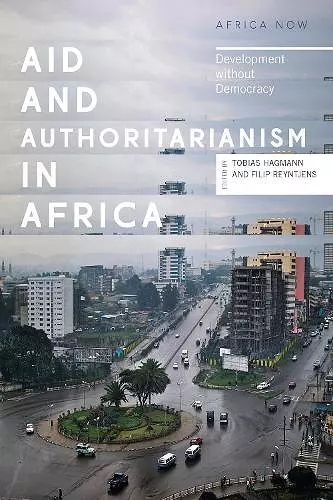Aid and Authoritarianism in Africa
Development without Democracy
Tobias Hagmann editor Professor Filip Reyntjens editor
Format:Paperback
Publisher:Bloomsbury Publishing PLC
Published:15th Mar '16
Currently unavailable, and unfortunately no date known when it will be back

A revealing and urgent insight into the motives, dynamics and consequences of the increasing amounts of development aid given by the West to authoritarian governments in Africa.
In 2013 almost half of Africa's top aid recipients were ruled by authoritarian regimes. While the West may claim to promote democracy and human rights, in practice major bilateral and international donors, such as USAID, DFID, the World Bank and the European Commission, have seen their aid policies become ever more entangled with the survival of their authoritarian protégés. Local citizens thus find themselves at the receiving end of a compromise between aid agencies and government elites, in which development policies are shaped in the interests of maintaining the status quo.
Aid and Authoritarianism in Africa sheds light on the political intricacies and moral dilemmas raised by the relationship between foreign aid and autocratic rule in Africa. Through contributions by leading experts exploring the revival of authoritarian development politics in Ethiopia, Uganda, Rwanda, Cameroon, Mozambique and Angola, the book exposes shifting donor interests and rhetoric as well as the impact of foreign aid on military assistance, rural development, electoral processes and domestic politics. In the process, it raises an urgent and too often neglected question: to what extent are foreign aid programmes actually perpetuating authoritarian rule?
Provides welcome relief from an academic literature which often treats official development assistance (ODA) in apolitical terms. * Africa at LSE *
The collection is helpful in drawing attention to some general truths concerning the aid relationship; truths that bear restating for each new generation of scholars, policymakers and practitioners. * African Affairs *
Anyone interested in foreign aid, African politics, authoritarian regimes, or the international dimension of democratization will find it well worth reading. * African Studies Review *
A well-organized, fascinating collection. * Foreign Affairs *
[A] timely collection of essays. * Medicine, Conflict and Survival *
A valuable addition to the literature on political evolution in Africa and the relationship to aid and donor-based development. * The Conversation *
A wake-up call to the international democratic community. Its rich, reflexive case studies analyze the broken promises of Western donors who have been supporting authoritarian governments in the name of peace and security. At a time when distrusting democracy has become fashionable again, this book cogently warns against the pitfalls of placing faith in dictatorship. * Andreas Schedler, author of The Politics of Uncertainty *
An excellent contribution that will be of great use to students and researchers interested in democracy and foreign aid in sub-Saharan Africa ... will undoubtedly become a standard book for courses on development assistance and on African politics. * Devon Curtis, University of Cambridge *
Easily one of the most important books on development published in recent years. It offers a brilliant and informed corrective to the near absence of any research on the important link between Western aid and authoritarianism. This is a must-read for all those concerned with where the globe's bankrupt political elites are taking us. * Mark Duffield, University of Bristol (Emeritus) *
This incisive collection sounds a timely warning: if Western aid donors sacrifice democracy and human rights in the quest for economic growth and national security, they become complicit in keeping African autocrats in power. * Michael Bratton, Michigan State University *
A thought-provoking collection on an important phenomenon of African and global politics. Its essays elegantly reveal the intersections between ideologies of progress, power politics, technocracy, and sovereignty. * Peter Uvin, Claremont McKenna College *
ISBN: 9781783606283
Dimensions: 232mm x 142mm x 14mm
Weight: 300g
192 pages